Stay in the know on all smart updates of your favorite topics.
People get more connected and technology becomes part of our daily life. Between 2014 and 2015 there was a 27% growth of internet traffic in Amsterdam. Eleven out of fifteen Trans-Atlantic data cables are connected with or go through Amsterdam and the AMS-IX is the second largest internet exchange point in the world. In 2016 Amsterdam was ranked second in the European Digital City Index. Do you work on a smarter city? Share your technologies here!
Smart cities are decades away: but open cities are within reach
At the ODI we are working on a project on Open Cities. We have just published a blog about why thinking about open cities, rather than smart cities, can lead to a better future. Interest to see what you all think.
Tada! The municipality of Haarlemmermeer endorses the manifesto
“We can equip traffic lights with heat sensors, so they only turn green when someone is actually waiting at the light. Who could object to that? But people balk at the idea of collecting data in the public space. That’s why the government needs to clarify what we want to achieve, and share knowledge with each other. Being open and showing the advantages is how you convince people to get on board. The more visible those benefits are to the end user, the more fun it gets.”
Recap of the event ‘Data dilemma’s #2 Sensing the city’
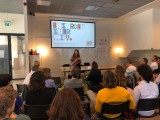
On the 6th of June, some people of the Amsterdam Smart City community came together in Datalab to discuss dilemma’s around sensing the city. What are issues around this theme? Who should do this? How can we involve citizens? What are the learnings up until now?
Leonie van den Beuken opens the afternoon and states that we should not only keep talking and keep figuring and losing time. Because time is what we don’t have. If you're aiming for a better world, you have to act now. ‘So today’, she says, ‘we have people who are acting upon our dilemma’s. And if we are truly able and willing to learn from each other, we can accelerate.’
Judith Veenkamp – Waag
Judith from Waag kicks off by telling about the Smart Citizens Lab. A research lab with a leading role for citizens and aims to facilitate them in measuring their own living environment, so called ‘public research’. Within the Smart Citizens Lab Waag developed a framework for citizen sensing: how to enable citizens in doing their own measurements. Not only are they in charge of sensing strategy for the sensors that will be deployed in the city, the data collected will also be analysed and interpreted together with citizens. Collecting the data together with citizens and other stakeholders, like municipalities, helps to create a shared reality.
For their project Hollandse Luchten, an air quality sensor was developed in their lab. The basic version measures Particular Matter (PM), temperature, humidity and air pressure. The extended version also measures NO2 and O3. They will deploy 200 sensors in 3 pilot communities; IJmond region, Zaanstad en Buiksloterham. The sensor is a modular system and citizens assemble the sensor themselves. The aim goes beyond just measuring, it is to have societal impact by increasing awareness. It is not an alternative for professional measurements but they can enrich the official air quality measurements and empower citizens.
A nice example of how tech can help build a sustainable city. Technology as a mean. Not just talking about it but also making and experimenting.
Ron van der Lans – City of Amsterdam about Air View
The City of Amsterdam recently announced that for the coming year, Google will measure air quality in the city. Ron van der Lans tells us more about this: ‘Air View is mobile measuring of air quality with Google Street View cars. The goal is to have a detailed year overview of air quality in various parts of Amsterdam. We will get insights in the flow of the air quality per street in Amsterdam. In the end it will be open data, but not during the process.’
Ron also takes us through the process of this project, in which the University of Utrecht is also participating, and shows what it went through before actually implementing. Different questions pop up from the audience. Some more practical; if it is only 1 point in time on every location, does it add value? There are already different measurement systems in place in Amsterdam: GGD , RIVM. What does this add?
Ron explains that it measures on street level, which is new. It will also measure more and it will contribute to create a global view. This also triggers more principled questions: if these are open data, how will it affect the housing market? Why does Google want to do this? Is this not a responsibility of the government? What aspects of political decision making were considered? What can and what will we do with the results?
Tom van Arman – CITIXL
Tom van Arman from CITIXL has an inspiring and triggering talk. Tom starts with warning us how data can affect us with some alerting examples. The large scale data collection in 1934 for the greater benefit of all but later misused by the Nazi regime. He also mentions the Chinese Social Credit Card Score; a system that is meant to rate each citizen’s trustworthiness. And last he shows us Quayside Toronto. A wonderful new future city, built by Google.
Will this really make our lives better or is it just for commercial benefits? How do we bridge the gap between policies and the public? How can we design tests with the public to create a shared reality and common understanding?
He ends with showing us his camera experiment of last year during WeMakeThe.City. The experiment featured a marked area telling you the area would recognize your face. All basis questions came up and this was a good discussion starter. This year CITIXL will start measuring all sorts of things on the Marineterrein; how many sunbathers, how many swimmers, a drowning alert, etc. Again a lot of ethical questions will be raised and dealt with. But if we can ‘t measure it, how can we improve it?
Roel van de Loo - SPPS
Roel has a lot of experience in measuring in the city, e.g. with eNoses in the Port of Amsterdam and starts with warning us that he will make us depressed: ‘Technology is not perfect and limited. Technology is still complicated for non-experts. Cheap sensors can be useful but they do not always tell the truth. They face difficulties for example with calibration and interferences. So be careful: it is not easy to measure. You have to know what a sensor does and what it does not.’
Roel shares some crucial lessons learned:
• Cooperation between governments, companies, foundations and citizens is essential but not easy.
• Make a detailed agreement. Once you share data between government and company, what is going to happen?
• Create a library and share learnings
Roel tells us there is a fundamental distrust of (government) calculations. Citizens only want to know what is wrong and they do not want to pay for it. Starting is easy but ending is hard.
------
After the presentations, an interesting discussion started. Some people feel comfortable Google will measure air quality: it’s already happening, so what is the fuzz about now? Others say: Air quality is a fundamental task of the government, so the measurement is the responsibility of the government. If the government starts measuring less because of the collaboration with businesses, will it minimize the measurement capacity? When a business has a different agenda, we have lost measurement capacity.
Leonie asks: What would be ok for you to be measured? Also here different opinions. Collecting data is necessary to make informed decisions and to take emotions out of the discussion. But teach people on how to do that. These data can bring us a lot of positive uses. But how do we use it for good? It’s a fine line between surveillance and service.
Someone else states that data collection is enforced and it takes away freedom of autonomous decision making. Again enough data dilemma’s to discuss. In the audience, Paul Manwaring closes stating we are all part of the city – we have to explore data opportunities, while respecting each other’s rights and be transparent, we’ve got to try!
The Defeat of two progressive Spanish mayors
In its May 25th edition, the Dutch newspaper 'De Volkskrant' covered the changes that two progressive mayors have induced: In Barcelona, Ada Colou and in Madrid Manuela Carmena. The elections, yesterday June 2nd, have ended their mandates. Although their successors have a radical left background too, their support in both city's councils is minimal. Here and in the national parliament, the socialist party and the center-right parties are the overall winners. Particularly the future of the recently renewed 'smart city-policy' in Barcelona, where Ada Colou and Francesca Bria are 'sisters in arms' is uncertain.
For more detailed information, I enclosed El Pais' English version from today: By the way: the smiling trio are representatives of the right wing Popular Party, not from the socialists as the titel might suggest.
Snap jij data? Doe mee aan de summerschool 'Design de toekomst van Zuid-Holland'
Begrijp jij data en vind je het leuk om daarmee oplossingen te bedenken voor complexe problemen? En wil je leren hoe je écht datagestuurd ontwerpt om zo de stad beter te maken? Dan is de summerschool ‘Design de toekomst van Zuid-Holland’ iets voor jou! In 3 dagen gaan we een digital twin (een digitale 3D-versie) maken van (een deel van) Zuid-Holland die het geluk en/of de leefkwaliteit van Zuid-Hollanders meet en voorspelt. We hebben nog enkele plekken beschikbaar dus meld je snel aan!
Je kan GRATIS meedoen als je nog studeert of net aan het werk bent en begrijpt dat er voor ingewikkelde problemen geen eenvoudige antwoorden volstaan. En soms ook wel. Je hebt een achtergrond in data science, ruimtelijke ordening, planologie, techniek, smart city, GIS, Geo en mediadesign, gamification, bestuurskunde, stedenbouw of iets anders interessants.
Data: 1, 2 en 3 juli
Locatie: verschillende locaties in Zuid-Holland
Deelname is gratis voor jongprofessionals.
Kijk op de website voor alle informatie en aanmelden: https://www.kennislabvoorurbanisme.nl/project/summerschool-juli-2019/
Becoming smart? My advise to a mayor
Until recently, no mayor asked me how to become a smart city. Recently, I talked to an audience of mayors and civil servants in Zagreb. When I told them that the first step to become smart is not about technology, their attention was caught. Then I advised them to go through six steps. Does your attention be caught too? Read my post.
You will find a Dutch version here: https://wp.me/p32hqY-1Ll
DSS LEADS SPECULATIVE FUTURES CHAPTER AMSTERDAM

The Digital Society School is proud to announce the opening of the Speculative Futures Chapter, Amsterdam.
Speculative Futures is an international community of meetups focused on Speculative & Critical Design, Design Fiction, Futurism, and Strategy & Foresight. Together, we will examine the ephemeral and the tangible; showcasing creative projects, far out research, and tangible strategies for affecting change. In our meetups we will be hosting workshops around speculative design for those interested in speculative design, critical design, discursive design, strategic foresight, futurism, science fiction and visionary approaches that use design and visual culture to imagine potential futures. From time, we would like to invite speakers—practitioners, teachers, students, and other professionals who will talk about their work and methods.
If you’re interested and would like to keep up to date with our meetups, please consider joining our meetup group: https://www.meetup.com/Speculative-Futures-Amsterdam/
The chapter will be lead by Theo Ploeg, design and media sociologist and Mick Jongeling, Digital Transformation Designer at Digital to Physical track.
Smart Cities or Dumb Cities - a debate at OBA Oosterdok
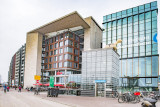
Toronto seems to become a testing ground for the urban development of smart cities. Sidewalk Labs, part of Google’s parent company Alphabet, will redevelop the city’s waterfront. Data will be used to design smarter, more sustainable designs, to handle waste better or to reduce our energy consumption. But with Google at the helm, data is also the capital of this city district: and what does that lead to? It is time to start the discussion with architects.
During the Architecture Residency of Do Janne Vermeulen we will organise a debate about smart cities on Tuesday 21 May. We discuss the developments of data in Amsterdam, look at the developments in Toronto and talk about the position of the architect. Through this debate we hope to feed the discussion from a design perspective.
What’s the question?
Architect in Residence Do Janne Vermeulen, architect and co-founder of Team V, visited Canada and is bringing the debate to the Netherlands. While reading, watching, writing and talking about smart cities, it is tempting to think in terms of technology instead of the city. Rather than “What do we want and how does smart technology offer a solution for that?” it is about “What possibilities does smart technology offer and what can we achieve with it?”
Privacy issues make the conversation even more difficult and sometimes make us long for the ‘stupid city’. But our spatial domain and the digital world are becoming more and more interconnected. Can we grow, densify and become more sustainable without smart systems? Is technology indeed the answer to our questions? What is exactly the problem with ‘stupid cities’? What are the benefits if we focus on digital technologies, analyse large amounts of data and provide the city with systems and IoT (Internet of Things) sensors? And what other means do we have? In short, a lot of questions to which smart technology might be the right answer. And maybe not.
Programme and speakers
Do Janne Vermeulen – Team V – Co-founder and architect
Meat Do Janne Vermuelen as our second Architect in Residence. She gives a short pitch about the role of big data in her field of expertise.
Marleen Stikker – Waag Society – Founder
Marleen Stikker supervises the digitisation of society with research and all kinds of initiatives from Waag Society. This evening she will share her views on the developments concerning Big Data. She also offers perspective on the role of the architect within smart cities.
Ger Baron – City of Amsterdam – Chief Technology Officer (CTO)
Ger Baron, the first CTO of Amsterdam, brings us up to speed on technological innovation and the digital transformation of Amsterdam.
Emil Zelic – Waterfront Toronto – Executive Director Project Management Office & IT
As an IT professional, Emil Zelic, who will fly in from Toronto, tells about where application and disruption of smart technologies meets design practices. He reflects on the progress and philosophises about the Smart City applicability in Amsterdam.
The lectures are followed by a debate between the audience and the speakers.
Smart Cities or Dumb Cities
Architect in Residence Debate: Do Janne Vermeulen, Team V
Date: Tuesday 21 May 2019
Time: Starts at 8PM / Door open at 7.45PM
Location: OBA Oosterdok, auditorium, Oosterdokskade 143
Language: ENGLISH
Tickets: € 12,50
Online tickets available at our ticket page
€300,000 available to build Platform for Cycling Innovations & Showcase Amsterdam as a Knowledge Cycling City
Are you . . .
* Passionate about the role that the bicycle plays in keeping Amsterdam and the metropolitan area accessible and livable?
* Playing an active role in sharing this knowledge internationally?
* Experienced with building digital platforms and innovation ecosystems?
If so, the City of Amsterdam and the Vervoerregio (Amsterdam Transport Region) could select your organization as the collaboration partner to support the following goals:
* Develop and share knowledge about cycling
* Stimulate innovation and experimentation in the field of cycling
* Profile Amsterdam nationally and internationally as a knowledge cycling city
* Stimulate bicycle use to achieve these goals
Why?
In its Multi-year Bicycle Plan (MJP), the municipality of Amsterdam profiles itself "nationally and internationally as The Knowledge City in the Field of Cycling.” According to the MJP, the City would like to create more room for experimentation in order to solve Amsterdam’s unique cycling challenges, and testing of innovative bicycle concepts plays an integral role in finding those solutions.
Amsterdam has been building on knowledge development in the field of cycling in a compact city, and the municipality is now taking a deliberate path toward a stronger profile of sharing knowledge and supporting innovation and experimentation. To achieve these goals, the municipality of Amsterdam and Vervoerregio seek support for the following activities:
1. Digital Knowledge & Innovation Platform
Knowledge sharing leads to concrete ideas, projects or initiatives. The winning proposal will need to detail plans for a digital platform which will be in both Dutch and English, through which knowledge and innovations concerning cycling in the Amsterdam region will be bundled and made accessible. It will provide a shared bicycle platform for companies, citizens, academic, municipality, and transport region and social organizations in the field of cycling for the Amsterdam region. The platform will also offer the opportunity to showcase Amsterdam as a cycling city internationally. The platform must be fully transferable, so that it can be managed and further developed by the municipality or third parties at the end of the term of the agreement.
2. Expanded Network in the Field of Cycling
The winning proposal will be charged with setting up, mobilizing, and stimulating a powerful network organization. Through this network, the makers, inventors, implementers and policymakers will share bicycle knowledge and will be empowered and supported to develop innovative ideas in close collaboration with the commissioning parties.
3. Receive Delegations
The Bicycle platform for knowledge sharing, innovation and experiment has a leading role in receiving international delegations, giving and organizing presentations, and arranging excursions for the many delegations that are expected in Amsterdam and throughout the region.
Interested?
Deadline for proposals is May 14 at 14:00 via TenderNed. All relevant documents and information can be found in Dutch via: https://www.tenderned.nl/tenderned-tap/aankondigingen/162544
Good Luck!
The wining proposal will play an important role in strengthening Amsterdam visibility as a cycling city nationally and internationally!
Finalists for ArenA Change the Game Challenge announced
Out of more than 180 international submissions, 35 appealing innovations have been selected. These finalists stand a chance to be used by the two million visitors the Johan Cruijff ArenA hosts each year.
In collaboration with Ajax, the KNVB and ID&T, the Johan Cruijff ArenA mounted the Change the Game Challenge to develop new, innovative services for visitors. Companies from all over the world have submitted a variety of products and services designed to enhance the visitor’s experience.
Help build an open data market and win 750,000 euro
Enter the competition and win up to 750,000 euro in co-financing for your idea for an open, trusted and fair market for data sharing. A market that is scalable and broadly applicable and that allows parties in the Amsterdam area to work on a smart, green and healthy region.
Are you an organization that is familiar with digital technology and do you know how to use your knowledge for a smart, green and healthy region? Register for this competition!
The City Innovation Exchange Lab (CITIXL) and the City of Taipei Department of IT win International Award for A.I. Camera test

During the Smart City Summit and Expo Taipei this May, CITIXL won the inaugural Go Smart Awards for "excellence in intercity PoC collaborative projects among cites" for their test of A.I. Cameras during We Make the City festival 2018. To watch the video visit https://vimeo.com/320951765
The Parters in this project included CITIXL, Smart Taipei, the City of Taipei IT department, UMBO Camera, The City of Amsterdam CTO office, Makerversity, The Marineterrein Amsterdam and We Make the City.
This was a landmark, multi-stakeholder, international collaboration to test A.I. Camera (Camera Vision) use in public spaces with citizens in an interactive and inclusive experiment. The award and recognition further validates CITIXLs unique approach to generating data plus dialogue with experiments that raise public awareness, test smart city solutions and inform public policy.
During We Make the City festival 2018 the project partners installed an UMBO smart camera and created an experimental zone in front of building 27 on the Marineterrein to collect data about the amount of people entering the zone. At the same time, the zone was marked by warning signs to inform people about the experiment and CITIXL conducted interviews that informed a workshop on camera vision as service versus surveillance during the festival.
Since early 2018 CITXL has been working with the City of Amsterdam CTO office and various partner cities to gain insights on interactive smart city technologies that create social impact and cross the bridge between the city and citizen. Other experiments such as Smart Water Meters in De Cuevel in co-operation with the City of Daegu and Reclaiming Urban spaces with the City of Boston are gaining international recognition as practical and socially impactful projects that improve peoples lives.
For more information about CITXL, their organisation, partners, projects and how they create value and social impact with cities by experimentation as a service please visit www.citixl.com
How do you want to shape the Digital City of tomorrow? Recap: de Digitale Stad | Pakhuis de Zwijger
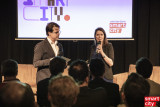
Last Thursday Amsterdam Smart City organized an open dialogue between its partners and Amsterdammers in Pakhuis de Zwijger. On the agenda: the Digital City. Because everyone deserves a seat at the table when it comes to shaping the digital city of tomorrow.
Leonie van den Beuken, the Program Director of Amsterdam Smart City, opens the night: ‘The changes necessary for the city and region to move forward, can only be achieved through collaboration. When it comes to driving innovations, we all depend on each other.’. With this night Amsterdam Smart City facilitates the conversation on the digital city between their partners (the City of Amsterdam, Nemo Kennislink, Tada) and interested citizens.
Personal freedom, inclusivity and creativity are the three main themes the City of Amsterdam focusses on in their ‘Digital City Agenda’. Responsible use of data is part of this. How do we gain control and ownership over our personal data in this transition to a Digital City? The City included the ‘Tada – data disclosed’ manifesto in the Agenda. Tada provides six principles to consider in the digital city: inclusive, control, tailored to the people, legitimate and monitored, open and transparent & from everyone, to everyone. ‘How far is the City in implementing these principles in its own organization?’ asks someone in the room. Practice what you preach: the City wants to set the right example by being the first municipality who puts the Tada manifesto into practice. Currently the City grades itself a 6/10 when it comes to implementing the manifesto. Still a long road ahead. Therefore Bart van de Sande (Innovation Officer, City of Amsterdam) invites everyone to send in their ideas on how to shape the Digital City.
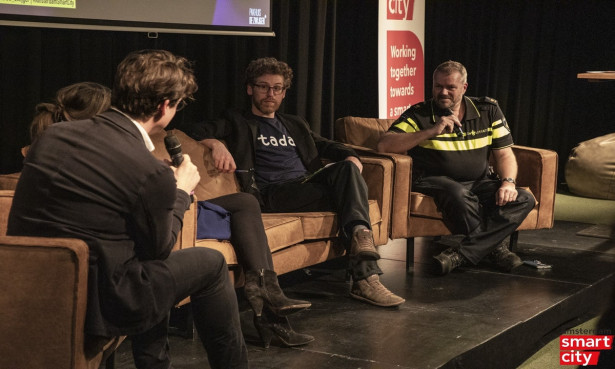
Douwe Schmidt (Boardmember,Tada) tries to activate citizens into the Digital City conversation: ‘Even though you don’t understand anything about technology or data, you are still entitled to decide on what happens to your personal data. You are entitled to have a say in this conversation.’. Nemo Kennislink is doing research on how to get citizens involved in the Digital City in collaboration with Amsterdam Smart City, VU University and AMS Institute. Research project is named Onderzoeksproject Catalyst, you can find more on this on our platform. Giovanni Stijnen (Senior Program Manager, Nemo) explains the research in three steps: i) activating citizens: using gamification or art to make the subject understandable; ii) verbalizing citizens: help people to articulate their vision on the Digital City; iii) connect & reflect: opening up the dialogue between citizens, policy makers and scientists – to get citizens involved in shaping their Digital City. Currently, they are in phase three of the project. Giovanni makes an appeal to the scientists and policy makers in the room: ‘*Do you want to participate in the dialogue with citizens? Contact me.*’
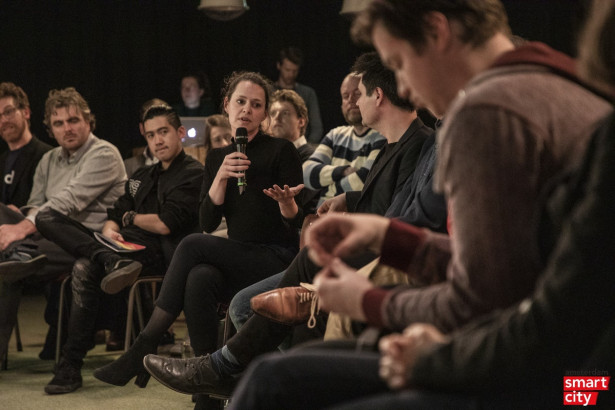
But why do we even want to transition to a more digitalized city? Daan Groenink (Innovation Officer, City of Amsterdam) and Marc Wiebes (Innovation manager, National Police) talk about the safety benefits of technology and data. Daan refers to the Digital Perimeter project (an Amsterdam Smart City project) in the Johan Cruijff ArenA area: ‘*Back in the day, we needed actual fences to regulate large numbers of people in a certain area. Nowadays, we can use smart sensors and smart cameras to assure safety. On the one side we can offer better services and experiences to the visitor, because the area is openly available. On the other side we can offer more safety in the area by using these technologies.’. Marc mentions an example of the City of Eindhoven: ‘The sensors send an automatic warning to the local police when they detect an unfriendly or aggressive tone. The police can respond directly to this warning. This decreases safety hazards.*’ The Digital Perimeter in the ArenA area will be a learning by doing project. That’s why the project needs your help: ‘How can we communicate to visitors that we are using smart technologies to guarantee safety? And how can we explain that we do not store and use personal data captured by the sensors and cameras?’ Post your best idea in the comments!
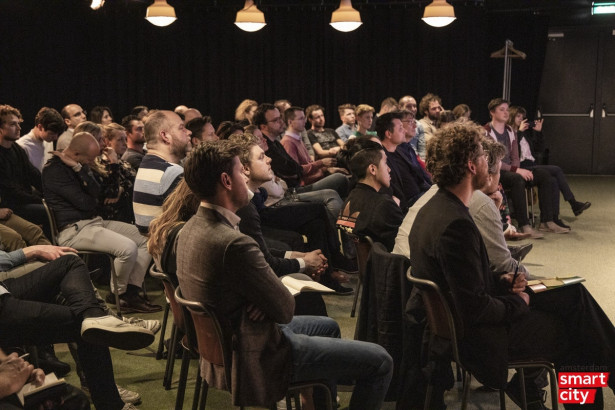
The next collaboration between Amsterdam Smart City and Pakhuis de Zwijger will be on the 23th of May. Did you miss the event? Don’t you worry.. You can watch the live feed at the website of Pakhuis de Zwijger (in Dutch):
V4 on the way to Smart Cities

Experts from V4 countries took part in the professional conference; David Bárta presented the National Concept of the Czech Republic in the field of Smart Cities in the form of public service innovations. Polish representative Mateusz Jarosiewicz discussed the possibilities of using Blockchain technology in cities. Milan Ftáčnik introduced the plans of the Smart Solutions and Innovation Council, which was created only a few weeks ago.
Full: https://smartcitiesklub.sk/v4-slovensko-na-ceste-k-smart-cities/
Bedrijfsleven roept op tot samenwerking Smart City ontwikkeling
Veel pilots, veel projecten, veel aandacht, veel events maar ... waar blijft de brede toepassing? Hoe kunnen we de pilots opschalen, successen in andere steden toepassen?
Wat volgens het bedrijfsleven zal helpen, is een centrale regie gevoerd door overheid en bedrijfsleven.
Bekijk hier de video met de oproep.
Of ga naar de website https://nlsmartcities.com voor meer informatie en meer video's.
How do you build privacy-friendly systems?
Suppose you want to know how many cars travel across a certain road. You could build a system that registers all license plates driving by. But you could opt for a system that will simply place a tally mark for every car that passes by. Both systems serve the same function: they count cars. However, the first one is a privacy nightmare. The second system is designed in such a way that it cannot document any personal information. Privacy is not a factor that you can just tack on a system after the fact; it needs to be included in the design phase as a requirement. This design philosophy is called privacy-by-design. Can we work towards Tada-by-design?
We think we can.
Read all about it on the Tada blog:
Tada and the City of Amsterdam: The first six months.
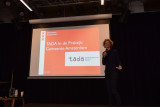
From https://tada.city - Reading time: 6-8 minutes
“Tada is a movement,” says Douwe Schmidt during the opening of the Tada in practice meeting. “It is the interaction of a large number of organizations and individuals that are focusing on the question: ‘What kind of digital society do we want?’ It is no longer a matter of determining whether or not we will have one. Now it is all about how to put that society into practice.” Over the past four months, the Municipality of Amsterdam and Bureau Tada have worked together to explore how the six Tada values can be put into practice. At the meeting, insights were shared with nearly sixty participants.
The practical implementation of Tada does not translate into a one size fits all approach. Unlike prescriptive legislation such as the General Data Protection Regulation, Tada is not a user manual that provides specific rules. Ethical principles like ‘the human factor’ and ‘from everyone – for everyone’ are soft values that need to be reinterpreted time and again. “Ethics cannot be outsourced,” says Tessa Wernink, who partners with Schmidt in Bureau Tada. “It is important for everyone to think about that in their work. Tada has taken the first steps by formulating six principles. These six points are not much different than established ethical values. But now it is a matter of applying them to the digital domain.”
“It is allowed, but we won’t do it”
Two speakers share stories from their own practice. Koen van Nol, legal expert at Schiphol, is involved in a pilot project involving ‘biometric boarding’ at the airport. In the experiment, boarding pass checks and passport checks are replaced with facial recognition. One of the insights Van Nol shares is that your organization’s identity plays a role in the decision-making process. “At each step, we verify whether it is legally allowed and whether it is technically possible. But in some cases, we reach the conclusion: it is allowed, it is possible, but we are not going to do it. That has to deal with the Schiphol identity. I have noticed in conversations with colleagues that Schiphol employees consider that very important. As a semi-government body, we believe that we hold a certain responsibility towards our customers.”
Jaap-Henk Hoepman, senior university lecturer at Radboud University in Nijmegen, explains how to make abstract values more tangible, transposing them into technical projects: “Privacy is a soft term. It is partly about ethics and partly about legal aspects. That makes it harder to implement than more tangible software attributes like security or performance.” To offset that, Hoepman developed eight privacy-by-design strategies. One of those strategies is minimization: do not collect more data than necessary. Another is abstraction: only share the specific information that is needed. For instance: the Gall&Gall sales employee does not actually need to know your date of birth; they just need to know if you are over 18.
Lessons Learned
G4 trainee Milou Jansen then stepped up on stage. For six months, she worked with Tada Agency on implementing Tada in the Municipality of Amsterdam, adopting the role of Values & Digitalization consultant. She shared some insights that recurred frequently during that project: Decisions about responsible data use must be taken at all levels of the organization. However, it is still all too common to see such decisions ending up with the data analysts. This could result in the unintended situation where data analysts become some type of gatekeepers, who need to encourage other people to use data responsibly. It is important for other employees to also consider this their responsibility. As a result, thinking about data use becomes an integrated part of everyone’s work. By extension, clients and contractors share a joint responsibility for data use. It is therefore important to discuss this at the beginning of a project. Take the time early in the process to carefully consider everything together. That will prevent delays later on in the process: take a moment to think at the start so you can accelerate later.
What can we do in tangible terms?
Milou Jansen bids farewell to the Municipality of Amsterdam to continue her traineeship in Utrecht. That is why she invited the attendees to join her in considering the question: ‘what next?’ during the interactive part of the meeting. The attendees joined in a discussion about applying Tada in the Municipality of Amsterdam. The discussion clearly revealed two things. On the one hand, it was considered valuable that Tada does not provide strict guidelines, but rather requires constant reflection. On the other hand, there is also a need for certainty – not just for civil servants, but also for citizens who need to be able to monitor what the municipal authorities are doing. People offered ideas related to both aspects in order to anchor Tada in the organization.
First, people in the organization need to become aware of Tada. Communication as well as meetings arranged within the organization will help create support amongst municipal employees. That should lead to a sense of responsibility which is felt by all the process owners, not just the specialists. Tada is not an exact science, so it requires employees to use their moral compass. That takes time: time to think, time to engage in dialogue, time to ask each other questions. People also mentioned developing a course on Tada, ethics and technology, and appointing ambassadors.
A number of suggestions were also made for ways to express Tada in more tangible terms. Pick a spot on the horizon: what is our course of action with Tada? Based on that distant view, we can draw up clear policy frameworks and work processes. Also appoint watchdogs that monitor the Municipality – like consultative groups, ethical advisory committees or a digital union. Finally, someone suggested expressing the abstract Tada values in more tangible terms by providing examples from actual practice. That will create common ground based on examples.
The conclusion of the overall discussion was that a cultural change is needed. The word Tada should not evoke confused questions; instead, it should be met with enthusiastic recognition. Not: Tada? But: Tada!
The Tada in practice meeting was a co-production of the Municipality of Amsterdam and Bureau Tada. It took place on 20 February 2019 at the Stadstimmertuin in Amsterdam.
Tada principes opgenomen in Agenda Digitale Stad
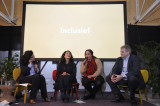
De eerste Amsterdamse Agenda voor de Digitale Stad werd op 1 maart gelanceerd. De agenda getiteld ‘Een digitale stad voor én van iedereen’ streeft naar een vrije, inclusieve en creatieve digitale stad. Verantwoord gebruik van data is daar een onderdeel van. Eén van de acties om dat te bereiken is de implementatie van het Tada manifest.
Wethouder Digitale Stad Touria Meliani presenteerde de Agenda in het vrolijk ogende pand van The Beach/Garage Notweg, een laboratorium voor sociale en duurzame innovatie in Nieuw-West. Ze wist meteen de aandacht te vangen van het 150 koppige publiek door het delen van persoonlijke data. Op het scherm toonde ze een WhatsApp gesprek met haar moeder. “Mijn moeder zou het liefst willen dat ik elke week op bezoek kom, maar dat kan niet want ze woont ver weg. Daarom delen we veel via WhatsApp. Ze is laaggeletterd daarom communiceren we veel via foto’s en audioberichten. We hebben persoonlijke gesprekken via dit systeem maar we weten niet wat er met die berichten gebeurd. Mensen stoppen hart en ziel in hun telefoon maar de bedrijven die achter deze technologie zitten, hebben andere bedoelingen. Hier zie je op een heel alledaags niveau een risico van digitalisering. De digitale stad gaat over de mensen die daar mee te maken hebben. En dat zijn wij allemaal.”
Amsterdam implementeert Tada manifest
Met haar voorbeeld legde wethouder Meliani één van de uitdagingen bloot die in de Digitale Agenda wordt benoemd. De dataverzameldrang leidt ertoe dat sommige partijen steeds meer macht krijgen. De data kan worden aangewend om gedrag te beïnvloeden en mensen te manipuleren. Daarmee wordt de vrijheid van Amsterdammers aangetast. De stad wil hier tegenwicht aan bieden. Amsterdam zet zich in voor betere regels die de privacy en autonomie van burgers waarborgen. Dat doet het niet alleen, maar in samenwerkingsverbanden op nationaal en internationaal niveau. Op lokaal niveau voegt de gemeente daad bij woord door verantwoord met data om te gaan. In het komend jaar gaat ze de Tada principes in de eigen organisatie implementeren.
In discussie over technologie
Douwe Schmidt van Bureau Tada kreeg het woord om het publiek meer over Tada te vertellen. “Tada is ontstaan uit een brede coalitie van burgers en organisaties. Die zijn in gesprek gegaan over de digitale stad en hoe we die willen vormgeven. Daar is het manifest ‘Tada – duidelijk over data’ uitgerold. Hierin worden zes principes benoemd die in de digitale stad zouden moeten gelden.” Een van die principes is bijvoorbeeld ‘inclusief’: de digitale stad moet, net als de fysieke stad, toegankelijk zijn voor iedereen.
Schmidt: “De volgende stap is om de Tada principes in de praktijk te brengen. Hoe vertaal je die abstracte waarden in iets concreets? Bureau Tada werkt samen met de gemeente om daar vorm aan te geven. We hebben workshops ontwikkelt waarin we praktisch met Tada aan de slag gaan. Eén van de methoden die we gebruiken is het spectogram. Daarmee starten we een discussie door naar concrete casussen te kijken.”Om een beter idee te krijgen hoe dat werkt, nodigde Schmidt de 150 aanwezigen uit deel te nemen aan een principiële discussie over technologie. Hij legde het publiek een stelling voor. Wie voor was ging staan, tegenstemmers bleven zitten. Bij de stelling ‘Amsterdam zal nooit gezichtsherkenning gebruiken’ stond een flink aantal mensen op. “Er wordt al op zoveel plekken data opgeslagen”, zei één van de voorstemmers, “en we hebben geen idee wat er mee gebeurd. Dus laten we voorlopig even wachten met het aanleggen van nog meer dataopslagplaatsen.” Een tegenstemmer beargumenteerde: “De bezwaren die je kan hebben tegen gezichtsherkenning, kan je te niet doen met technische oplossingen en goede regels.” Er was ook iemand die zich in beide standpunten niet kon vinden: “Je moet niet van die boude uitspraken doen waarin het alles of niets is. Misschien vind je dat je geen camera’s met gezichtsherkennning op straat moeten worden geplaatst. Daar kan je een debat over voeren. Maar vooraf technologieën uitsluiten zonder daar een gesprek over te voeren, is niet de juiste weg.” Schmidt: “Zo zie je maar dat als je casussen gaat bespreken er direct discussie ontstaat. Mensen willen hier met elkaar van gedachte over wisselen. Tada is begonnen met het benoemen van principes waar we de digitale stad op willen stoelen. Nu maken we een verdiepingsslag door er met elkaar over te praten en de principes concreet toe gaan passen.”
Privacy in de digitale stad
Na de presentatie van Tada nodigde wethouder Meliani verschillende mensen uit op het podium. Voor het ontwikkelen van de Digitale Agenda legde ze veel werkbezoeken af. Ze ontmoette veel mensen die haar inspireerden. Met een aantal van hen ging ze tijdens de lancering in gesprek. Met Marleen Stikker van De Waag sprak ze over privacy. Stikker: “Het woord privacy is aan erosie onderhevig daarom spreek ik liever over zelfbeschikking. Zeg je privacy dan hoor je vaak: ‘ik heb niets te verbergen’. Maar het gaat er niet om of je iets op je kerfstok hebt staan. Dat zie je aan het gesprek tussen wethouder Meliani en haar moeder. Het gaat om de wens de privé sfeer te behouden. Bij zelfbeschikking gaat het over de vraag: maken wij nog onze eigen keuze? We worden genudged en gemanipuleerd. Zelfbeschikking is een hoeksteen van de rechtstaat. Maar op het digitale gebied wordt ons heel veel uit handen genomen.”
Mark Wiebes van de Nationale Politie zei over privacy: “Tijdens de Tada discussie kwam het dilemma van gezichtsherkenning herkenning aan de orde. Het is heel verleidelijk om dat soort technieken in te zetten voor opsporingsonderzoek. Maar iedereen die bij de politie gaat, zweert een eed om burgers en burgervrijheden te beschermen. Privacy is één van die vrijheden. Maar technologie moet je ook niet zonder meer aan de kant zetten. Het niet gebruiken van technologie heeft ook een prijs. Dus moet je verschillende mogelijkheden overwegen. Bijvoorbeeld het inbedden van privacyregels in de technologie.”
De wethouder vertelde over twee concrete acties uit de Digitale Agenda die de privacy van Amsterdammers doet verhogen: “Alle burgers krijgen een Mijn Amsterdam, een persoonlijke digitale omgeving. Hier kan je inzien welke gegevens de gemeente over jou heeft opgeslagen.” Daarnaast wordt half maart een digitale kaart gelanceerd waarop slimme apparaten zijn aangegeven. Hierop kunnen burgers zien waar de gemeente camera’s en andere meetinstrumenten heeft geplaatst. Ook kan worden bekeken welk type data de sensoren verzamelen.
Een inclusieve digitale stad
Over de inclusieve stad sprak de wethouder met Fatimzahra Baba van stichting Saaam. Saaam helpt laaggeletterde moeders bij het begrijpen van social media. Hun kinderen gebruiken social media en hebben zo een wereld waar de ouders niet bij kunnen. Er worden onderwerpen besproken als exposing (het delen van ongewenste foto’s of verhalen op social media). Een dochter die dat had ondervonden was depressief geraakt. Ze praten met elkaar over hoe de digitale weerbaarheid van hun kinderen te vergroten. Baba: “Over laaggeletterde moeders wordt vaak gezegd: ‘Ze kunnen niet en ze willen niet’. Maar dat is niet waar. Ze willen wel!”
“Inclusief betekent ook dat iedereen mee moet kunnen doen”, zei de wethouder. “Daarin hebben we als gemeente ook stappen gezet. We hebben met verschillende mensen om de tafel gezeten. Iemand met een fysieke beperking, een slechtziende. Zij wezen ons op tekortkomingen. Een slechthorende gaf aan dat sommige gemeentelijke informatie alleen telefonisch opgevraagd kan worden. Deze mensen moeten de digitale stad mee gaan ontwerpen. We zijn nog te weinig in staat vanuit een ander perspectief naar mensen te kijken. Maar als we een inclusieve stad willen is dat wel nodig.”
De bijeenkomst werd afgesloten met de officiële lancering van de eerste Amsterdamse Agenda Digitale Stad. In het voorwoord stelt wethouder Meliani: “De stad is van iedereen, de digitale stad ook.”
Check de Agenda Digitale Stad hier: <https://amsterdamsmartcity.com/posts/agenda-digitale-stad-gelanceerd>
Foto: v.l.n.r. Gülden Ilmaz (moderator), wethouder Touria Meliani, Fatimzahra Baba - stichting Saaam, Sander Klous hoogleraar Big Data Ecosystems Universiteit van Amsterdam.
(c) Henk Rougoor
A major 21th century challenge for humanity: taming technology
Many are puzzled by Google's involvement in (smart) city development in Toronto. From an urbanist's viewpoint, sister company Sidewalk Lab's proposals make sense. This short essay reveals that the ability to collect data on an up to now unprecedented scale might be the price. The Toronto case offers important lessons for would-be smart cities.
Find the Dutch version here: https://wp.me/p32hqY-1JF
Stay up to date
Get notified about new updates, opportunities or events that match your interests.

